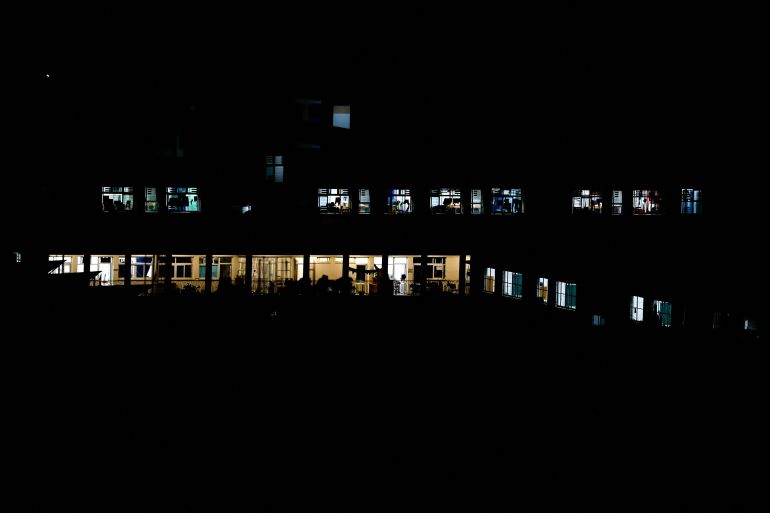Why is Gaza out of fuel — and what now?
The enclave is under a power blackout after Israel has stopped all fuel, food and other essential supplies.

Israel has bombarded the densely populated Gaza Strip, home to about 2.3 million people, with missiles since the Palestinian group Hamas launched a surprise attack last weekend.
Now, the enclave is without power, pushed into a complete energy blackout after Gaza’s sole power plant will run out of fuel on Wednesday, affecting essential services including hospitals.
Keep reading
list of 4 itemsPalestinian doctor Ghassan Abu-Sitta denied entry into France
‘Progress’ in Gaza truce talks but Israel still set on Rafah ground attack
‘We won’t stop’: The 24 hours Columbia etched a new Gaza protest legacy
Where does Gaza get its electricity?
Israel cut off the electricity supply and blocked the entry of food and fuel to the Gaza Strip as part of a “total siege” strategy adopted on Monday, in retaliation against the Hamas attack.
Egypt also closed its crossing into Gaza on Tuesday after Israeli air raids hit the border area.
With the enclave’s sole power plant running out of electricity, its people will now rely solely on backup fuel-run generators.
However, the Palestinian Health Minister Mai al-Kaila announced that “the fuel stock to operate the generators in the Gaza Strip hospitals will end tomorrow, Thursday, which will exacerbate the disastrous conditions in the hospitals.”
Why can’t Gaza get more fuel?
The Gaza Strip has been under an Israeli land, air and sea blockade for the best part of two decades.
That has meant that the people of Gaza are cut off from the rest of the world, and live in what many human rights and law experts have described as an open-air prison.
The blockade has also meant that the Gaza Strip depends on fuel, food and medical supplies that come from or pass through Israel.
With the “total siege” in place, even that’s not possible any more.
This, in turn, means bringing in any fuel for the power plant or the fuel-run generators is effectively impossible.
Srinivas Burra, an international humanitarian law expert and professor at New Delhi’s South Asian University described Israel’s actions as a “clear violation” of international law.
“Israel’s prime minister has said that his country is at war. Once you make that declaration, you are required under international law to follow the rules of war,” Burra told Al Jazeera.
Israel isn’t doing that, he said.
“It’s the first rule of war: It must stay between combatants,” Burra added. “When you punish civilians in the way Israel is doing, that’s clearly illegal.”
How badly are hospitals affected?
Hospitals in the besieged enclave, already overwhelmed by victims of Israeli bombing, are relying on generators that are not equipped to power many critical medical devices, said Hassan Khalaf, the medical director of Al-Wafa Hospital in Gaza City.
Khalaf predicted the generators have a life of only “maximum: a few days”, and may be as short as a day or two, amid dwindling fuel supplies resulting from the complete blockade.
He said there are currently 100 newborn babies relying on electricity-powered medical equipment in the Gaza Strip. “These newborns, they could not survive … because they depend in every aspect of life on electricity and equipment,” he told Al Jazeera. “They are very tiny. They are very weak.”
The doctor also said there were about 1,100 patients who rely on dialysis machines for survival in Gaza, saying the Israeli siege amounts to “mass killing”.
How has the international community responded?
On Tuesday, the United Nations High Commissioner for Human Rights Volcker Turk said Israel’s refusal to supply food, fuel and other essential commodities to the Gaza Strip was prohibited under international law.
Even the European Union, which has strongly backed Israel’s assertion that its response to the Hamas attack was driven by a desire for self-defence, has criticised the total siege on Gaza.
Josep Borrell, the EU’s foreign policy chief, on Tuesday said Israel was violating international law.